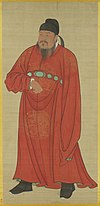Wikipedia:Main Page history/2018 June 18
From today's featured articleA Waterloo Medal was designed by sculptor Benedetto Pistrucci. Commemorating the Battle of Waterloo (18 June 1815), the medal was commissioned by the British Government in 1819 on the instructions of George IV while Prince Regent; copies were to be presented to the victorious generals and to leaders of Britain's allies. The Prince Regent and William Wellesley-Pole, Master of the Mint, had been impressed by Pistrucci's models, and gave him the commission. Pistrucci fell from grace at the Royal Mint in 1823 by insisting on his own designs and refusing to copy another designer's work, and he likely concluded he would be sacked when the medal was finished. He delayed completion until 1849, when he submitted the matrices to the Mint. As most of the intended recipients had died by then, and relations with France had improved, the medals were never struck, though modern-day editions have been made for sale to collectors. Pistrucci's designs have been greatly praised by numismatic writers. (Full article...)
Recently featured:
Did you know...
|
In the news
On this day
Rogier van der Weyden (d. 1464) · Max Immelmann (d. 1916) · Michael Hastings (d. 2013) |
From today's featured list

Nobel laureates in Physics are determined annually by the Royal Swedish Academy of Sciences. The Nobel Prize in Physics is awarded to scientists in the various fields of physics. It is one of the five Nobel Prizes established by the 1895 will of Alfred Nobel (who died in 1896), awarded for outstanding contributions in physics. As dictated by Nobel's will, the award is administered by the Nobel Foundation and awarded by a committee that consists of five members elected by the Royal Swedish Academy of Sciences. The award is presented in Stockholm at an annual ceremony on December 10, the anniversary of Nobel's death. Each recipient receives a medal, a diploma and a monetary award prize that has varied throughout the years. (Full list...)
Today's featured picture

|
A 15-cent banknote depicting Union Army generals William Tecumseh Sherman and Ulysses S. Grant, dated 1866 and intended as part of the fractional currency introduced to the United States following the American Civil War. As the portraits of Sherman and Grant for this note were being finalized, Representative Martin Russell Thayer pushed forward legislation specifically stating "that no portrait or likeness of any living person hereafter engraved, shall be placed upon any of the bonds, securities, notes, fractional or postal currency of the United States". As such, the Sherman-Grant note was never issued; examples of this note exist only as specimens. Banknote: Bureau of Engraving and Printing (courtesy of the National Numismatic Collection, National Museum of American History)
Recently featured:
|
Other areas of Wikipedia
- Community portal – Bulletin board, projects, resources and activities covering a wide range of Wikipedia areas.
- Help desk – Ask questions about using Wikipedia.
- Local embassy – For Wikipedia-related communication in languages other than English.
- Reference desk – Serving as virtual librarians, Wikipedia volunteers tackle your questions on a wide range of subjects.
- Site news – Announcements, updates, articles and press releases on Wikipedia and the Wikimedia Foundation.
- Village pump – For discussions about Wikipedia itself, including areas for technical issues and policies.
Wikipedia's sister projects
Wikipedia is hosted by the Wikimedia Foundation, a non-profit organization that also hosts a range of other projects:
| |
Commons Free media repository |
|
MediaWiki Wiki software development |
|
Meta-Wiki Wikimedia project coordination |
| |
Wikibooks Free textbooks and manuals |
|
Wikidata Free knowledge base |
|
Wikinews Free-content news |
| |
Wikiquote Collection of quotations |
|
Wikisource Free-content library |
|
Wikispecies Directory of species |
| |
Wikiversity Free learning materials and activities |
|
Wikivoyage Free travel guide |
|
Wiktionary Dictionary and thesaurus |




